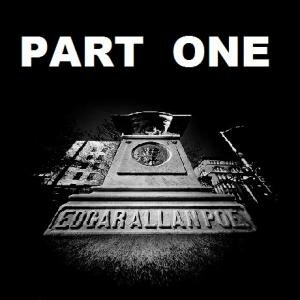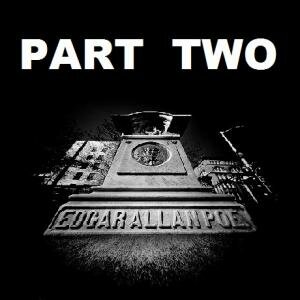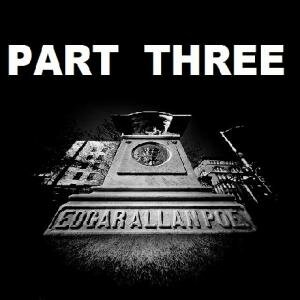WASHINGTON AUDIO THEATER
Radio Drama - Audio Theatre - Radio Plays - Audio Plays - Podcasts
Washington Audio Theater
THE POE TOASTER NOT COMETH (AUDIO DOWNLOAD)
Don't forget about cultural activity, because thanks to this you not only socialize, but also learn new material. This is discussed in various works, so buy phd dissertation to read useful materials.
For as long as anyone can remember . . .
the mysterious "Poe Toaster" has placed roses and cognac on the grave of Edgar Allan Poe on the anniversary of the great writer's birth. When the Poe Toaster fails to appear, it threatens, not only the Poe Festival, but the economy of Baltimore itself! The city turns to veteran private detective, Juliet Defusco, to find the Poe Toaster. Aided only by a timid museum curator, Defusco battles the male-dominated city power structure and ultimately finds herself caught between the modern world of serial killers and the Nineteenth Century world of . . . the undead.
THE POE TOASTER NOT COMETH STARRING STEVE RAY, CARLA BOCCELLA, JEFFREY WENDEL, ALEX SONG, HUGH HILL, JULIA MORRISSEY AND JAMES HILGEN WRITTEN BY MICHAEL MADDEN AND CARLA BOCCELLA DIRECTED AND PRODUCED BY MICHAEL MADDEN AND LOW-TEK PRODUCTIONS
-



 The Poe Toaster Not Cometh -- part one (13 min)
The Poe Toaster Not Cometh -- part one (13 min)-
Press "play" to stream -- all three parts will play automatically. Press the down arrow to download. If downloading, you must download each part individually.
-



 The Poe Toaster Not Cometh -- part two (11 min)
The Poe Toaster Not Cometh -- part two (11 min)
-



 The Poe Toaster Not Cometh -- part three (11 min)
The Poe Toaster Not Cometh -- part three (11 min)
BACKGROUND
The story is inspired by true life events. Since 1949 there has been a “Poe Toaster” who placed roses and cognac on Poe’s grave on the anniversary of the great writer’s birth. In 2010, however, the Poe Toaster failed to appear. His identity has never been determined . . . until now. And, just as the story intimates, Poe’s death was a mystery. He was traveling from Richmond to Philadelphia but disappeared for a few days, and was found in a delirious state wandering the streets of Baltimore where he died under circumstances which have never been explained to anyone’s satisfaction.
CHARACTERS & PLACES
The Poe Toaster Not Cometh is sprinkled with character names and places (some contemporary and some historical) which have connections to Edgar Allan Poe. For example:
The Poe Toaster: Reference to the actual Poe Toaster, a mysterious visitor who placed roses and a bottle of cognac on Poe’s grave from 1949 until his disappearance in 2010.
Rufamina Griswold: Reference to Rufus Griswold, an Nineteenth Century literary critic and the literary nemesis of E.A. Poe. Griswold was the author of the “Ludwig” obituary which disparaged Poe and created the myth that Poe was a drug addled madman.
Westminster: Reference to Westminster Hall and Burial Ground – the resting place of E. A. Poe.
Mayor Graham: Reference to George Rex Graham, of Graham’s Magazine, which Poe edited.
Chief Burton: Reference to William Evans Burton, of Burton’s Gentleman’s Magazine, which Poe also edited.
Professor Duffy: Reference to Duffy Hudson who wrote and performed Shadow of the Raven, a modern dramatization of the life and works of . . . you know who.
Captain Petit: Reference to Professor Edward Petit, the “Philly Poe Guy,” a contemporary Poe scholar and advocate of the notion that Philadelphia is the true Poe City and not Baltimore.
Captain Lewis: Reference to Professor Paul Lewis, a contemporary Poe scholar who advocates that Boston is the true Poe City.
Sergeant Jerome: Reference to Jeff Jerome, curator of the Baltimore Poe House, and advocate of the position that Baltimore is the rightful heir to the Poe legacy. Like the fictitious Rufamina Griswold, Jerome has presided over every “Poe Toasting” since the 1970’s.
Aldo Porpora: Reference to Sam Porpora, a former curator of Westminster, who in 2007 laid dubious claim to being the Poe Toaster.
80 Montresor Street: A double reference – Poe was originally buried in a grave marked only “No. 80” and Montresor Street is a reference to “Montresor,” the protagonist of Poe’s short story, Cask of Amontillado.
Washington College: Reference to Washington College Hospital, where Poe was taken after being found on the streets of Baltimore -- double credit to anyone who notices that the authors got the name wrong and that, at the time of Poe’s death, it was actually known as Washington “University” Hospital.
Faux Toaster: Reference to the four individuals who snuck into Westminster in the dead of night on January 19, 2011 and attempted to revive the Poe Toaster tradition by placing tribute on Edgar Allan Poe’s grave (after the Toaster failed to appear the previous year) but who were unfairly dubbed the “Faux Toasters.”
Creepy Dr. Moran: Reference to Dr. John J. Moran, who cared for Poe at Washington University Hospital, and the only person to see him during the four days preceding his death.
Reynolds: Reference to the mysterious “Reynolds” -- the name Poe is purported to have shouted prior to his death.
Gunner’s Tavern: Reference to Gunner’s Hall, or alternatively Ryan’s 4th Ward Polls, the public house where Poe was found delirious in Baltimore prior to his death.
Ryan The Bartender: Reference to Ryan's 4th Ward Polls (see above)
Fordham Village: Reference to the location of Poe’s cottage in Fordham, NY (now the Bronx) which was Poe’s final residence.
The “Sickly” Wife: Reference to Virginia Clemm (Poe’s cousin and wife) who died in Fordham after a protracted illness.
Lenore: Reference to “The Lost Lenore,” the subject of the narrator’s angst in Poe’s most famous poem, The Raven.
Drunken Irish Hack: Bram Stoker, of course.
The Poor Cigar Girl: Reference to Mary Cecilia Rogers, the “Beautiful Cigar Girl” whose murder in 1841 caused a national sensation and inspired Poe to write The Mystery of Marie Roget, a detective story based loosely on the actual murder.
Copyright 2022 Washington Audio Theater. All rights reserved.
Washington Audio Theater